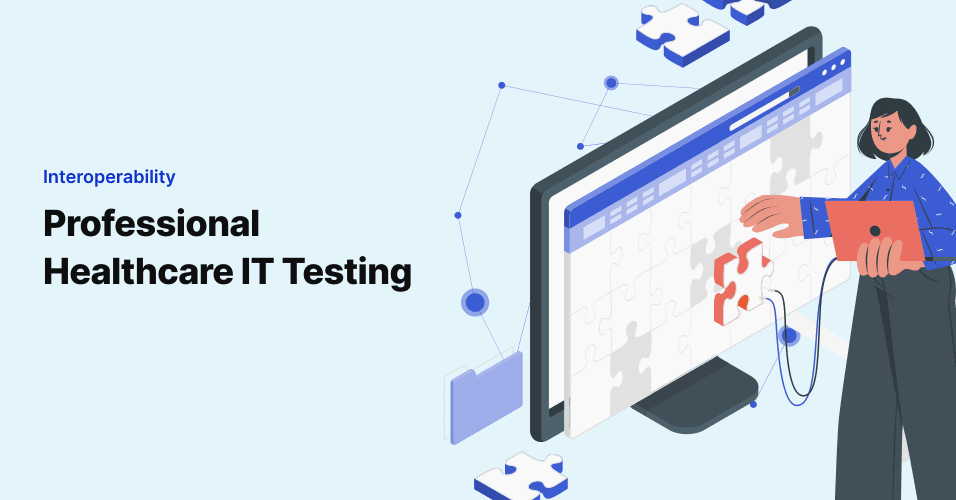
How Health Systems Can Target Niche Markets With Technology
Given the sheer complexity of managing patients across the care continuum for a community or population, it’s …

We’ve worked with many healthcare clients over the years, and while there is no shortage of impressive and innovative solutions out there to support patient care, there are limitations to how successful those implementations will be without proper support. Delivering interoperability for hospitals and health systems is not exactly a simple task, but when the project team is stacked with the right resources, the dream of comprehensive care records and improved population health comes much closer to reality for the sponsoring entity. A critical aspect of this process is a well-planned, detailed testing plan to ensure that clinicians and patients alike can embrace new technology with full confidence in the data and security behind it. Let’s examine three specific reasons for opting for professional healthcare IT testing to drive interoperability among care solutions.
One of the pitfalls of utilizing Super Users (or “borrowing” any other clinical end user) for testing duty is that, generally speaking, most of these folks are going to be somewhat limited in their ability to fully vet the solution. They’re medical professionals, after all, not health IT testers! Not only is their time exceedingly valuable elsewhere given the pressure on care delivery and the volume most hospitals are dealing with, but there are aspects of a technology solution — even healthcare-centric technology — that are best evaluated by a professional quality assurance resource.
Sure, a savvy nurse or applications specialist can run the workflows and confirm functionality, but an experienced interoperability tester is able to take into consideration the whole spectrum of features and functions, including:
Missing any of these elements could result in a system that doesn’t function as expected, or worse, leaves a potential security gap in a production environment that simply wasn’t caught during testing.
An area that health system executives often don’t consider is how their HIPAA policies are actually verified. You can develop the most impressive-sounding guidelines for your organization, but if employees and vendors — including healthcare IT partners working under a BAA — aren’t ever measured on their alignment with these well-meaning statements, then they’re meaningless. And more importantly, your organization is at risk.
Consider, then, the value of having a documented set of test cases to use as validation that the interoperable systems powering care delivery were vetted against specific controls called out in the organization’s HIPAA policy. An entity can claim that strong passwords are required and logout occurs after twenty minutes…but does it really? Can users disable those security measures? (Pro Tip: If they can, they will. Lock it down.)
Without a qualified testing professional thoroughly evaluating aspects beyond just feature-function, you’re susceptible to unsavory surprises and unexpected work-arounds that render your whole security policy weak.
Integration projects in the healthcare space have a tendency to grow and morph over time. As new solutions or APIs are available, the ability to leverage existing systems more effectively is often enhanced by the latest-and-greatest tools to market. This means that interoperability is never really done, though. Engaging professional testing for the full health IT solution is the best way to ensure that regression testing is performed faithfully at every iteration of the project. It’s not uncommon for novice testers to rely on “smoke tests” as updates and bugs ebb and flow, focusing only on the updated or new functionality.
Confidence in the full spectrum of the healthcare solution is key, however, and failing to invoke true end-to-end regression testing before pushing out a live system is a recipe for disaster. Every interface counts, every data point matters, and every potential user entry must be reviewed to ensure everything functions as expected, especially when clinical decision rests on the data available (or not).
Developing detailed test cases (as previously discussed), ensuring that they’re updated each release or iteration, and ensuring that proper regression testing occurs on all potentially impacted system is vital for interoperability success.
Join over 3,200 subscribers and keep up-to-date with the latest innovations & best practices in Healthcare IT.

Given the sheer complexity of managing patients across the care continuum for a community or population, it’s …

Artificial Intelligence (AI) in 2024 has emerged as a beacon of transformation, promising to redefine the …

The healthcare industry is in the midst of a positive shift towards innovation and transformative …